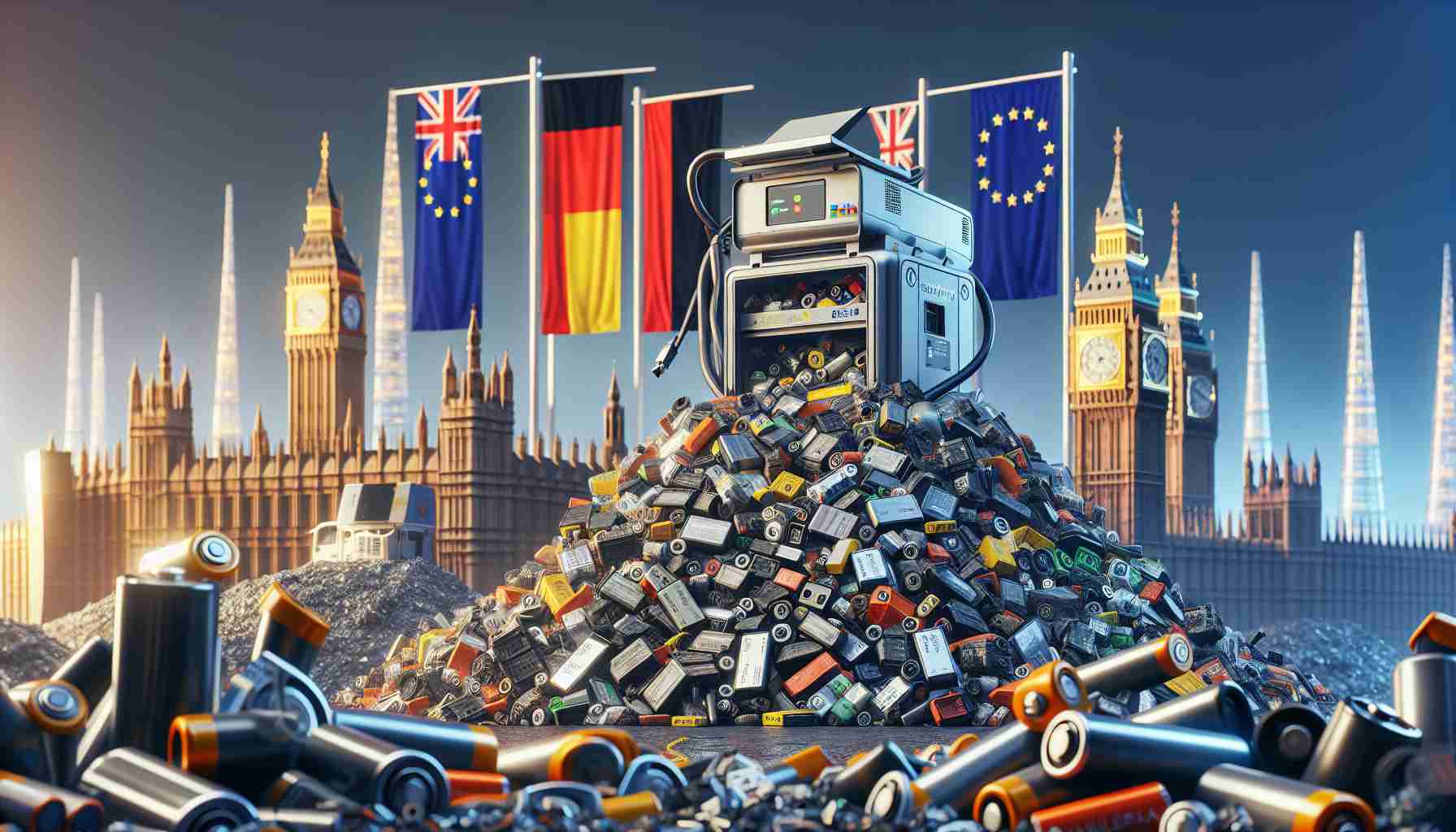- EU regulations set for 2030 will require recycled content in electric vehicle (EV) batteries, prompting innovation in recycling technologies.
- British startup Altilium has developed a process to recycle used materials into high-performing battery components, reducing CO2 emissions by 70% and production costs by 20%.
- Altilium is working with Tata Motors’ JLR to recycle Jaguar i-Pace EV batteries, supported by global investors.
- German startup tozero is focusing on graphite recycling, aiming to produce 2,000 tonnes of recycled graphite annually by 2027 with €17 million in investment.
- The advancements by Altilium and tozero highlight a sustainable shift in the EV battery industry, aligning efficiency with environmental responsibility.
As the sun sets on Europe’s dependency on traditional battery supply chains, a new dawn heralds a significant shift: the rise of groundbreaking EV battery recycling technologies. With EU regulations poised to take effect in 2030, mandating recycled content in electric vehicle batteries, two ambitious startups are paving the way for a sustainable future.
Under the cloudy skies of Great Britain, the plucky startup Altilium has unveiled an innovative process that transforms used materials into high-performing components rivaling even the pristine products of China’s factories. Their visionary methods, lauded by studies from the prestigious Imperial College London, slash CO2 emissions by a staggering 70% while trimming production costs by 20%. Behind the scenes, a cast of global investors propels Altilium forward, even as it partners with Tata Motors’ JLR to rejuvenate the heart of old Jaguar i-Pace EVs.
Meanwhile, across the lush landscapes of Germany, tozero embarks on a revolutionary journey toward graphite recycling. Essential to battery creation, graphite carries a hefty environmental toll, accounting for a significant portion of a lithium-ion battery’s carbon footprint. Armed with €17 million in investment, tozero is poised to erect a pilot plant within two years, with ambitions to churn out 2,000 tonnes of recycled graphite annually by 2027. As negotiations with global automakers unfold, the drive towards sustainable EV production gains unstoppable momentum.
This convergence of innovation and necessity charts a thrilling course for the future. The message is clear: through recycling, we not only liberate ourselves from environmental burdens but also inspire a new paradigm where efficiency and responsibility walk hand in hand.
Revolutionizing EV Battery Recycling: How Startups Are Leading the Charge
Understanding EV Battery Recycling: Key Steps and Innovations
The emerging focus of startups like Altilium and tozero on EV battery recycling highlights a significant shift in the automotive industry. As traditional battery supply chains evolve, understanding how this new wave of technology works is essential.
How-To Steps for EV Battery Recycling:
1. Collection and Sorting: EV batteries are collected from end-of-life vehicles and sorted based on their chemical composition.
2. Dismantling: Batteries are dismantled to extract usable materials such as lithium, cobalt, and graphite.
3. Material Recovery: Innovative processes are employed to reclaim valuable materials. Altilium’s method, for example, efficiently converts recovered materials into high-performing battery components.
4. Regeneration and Manufacturing: Recycled materials are processed into new battery components, ready for manufacturing.
Life Hacks for Homeowners Considering EVs:
– Consider Recycling Programs: When purchasing a new EV, inquire about the manufacturer’s battery recycling programs or partnerships, assisting in sustainability practices.
– DIY Disposal Tips: Store old electronics properly and recycle them at designated locations to contribute to resource recovery.
Real-World Use Cases and Industry Trends
The European Union’s stringent 2030 regulation timeline underscores a commitment to sustainable electric vehicle production, influencing global trends.
Use Cases:
– Partnerships with Automakers: Collaborations like that of Altilium with Tata Motors’ JLR demonstrate practical applications, where recycled materials reinvigorate older EV models.
– Pilot Projects: tozero’s initiative, aiming for significant graphite production by 2027, showcases the scalability of these technologies.
Industry Trends:
– Increased Investment: Growing interest from global investors indicates confidence in the future of EV battery recycling.
– Technological Advancements: Research and development in material sciences continue to improve recycling efficiency and environmental performance.
Market Forecasts and Industry Trends
With EU regulations driving the market, EV battery recycling is poised for rapid growth, with the global market potentially hitting $12.2 billion by 2025 (ResearchAndMarkets.com).
– Rising Demand: Accelerating global EV adoption increases the demand for sustainable battery production.
– Increased Market Competition: Startups and legacy companies may engage in strategic partnerships and mergers to co-develop new technologies.
Reviews and Comparisons
While Altilium focuses on overall battery component recovery, tozero emphasizes graphite recycling.
– Altilium: Its process cuts CO2 emissions dramatically, appealing to environmentally conscious manufacturers.
– tozero: Pioneering graphite recovery and focusing on high-volume production can cater to companies seeking specialized materials.
Controversies and Limitations
Despite their potential, these advances face challenges:
– Scalability: Moving from pilot projects to full-scale operations could encounter logistical and technological hurdles.
– Quality Concerns: Recycled materials must match the performance of virgin materials to be viable on a larger scale.
Security and Sustainability Insights
With recycling technologies, Europe aims to reduce dependency on external raw materials, reinforcing energy security and reducing environmental impact.
– Circular Economy: This shift promotes sustainable practices by encouraging a closed-loop system of material reuse.
– Expert Opinion: Sustainability experts underline the importance of this transition in meeting climate goals.
Recommendations for Consumers and Businesses
For Consumers:
– Support Brands Committed to Sustainability: Choose automakers and suppliers prioritizing recycled materials in EV production.
For Businesses:
– Invest in Recycling Technologies: Automotive and tech companies should explore partnerships with recycling startups to enhance sustainability credentials.
Conclusion
In conclusion, new EV battery recycling technologies mark a pivotal move towards sustainability in the automotive industry. Through innovative processes and strategic investments, startups like Altilium and tozero are setting the stage for a cleaner, more efficient future.
For more insight, visit the prestigious Imperial College London website for their detailed studies on CO2 emissions reductions and battery technology advancements.







